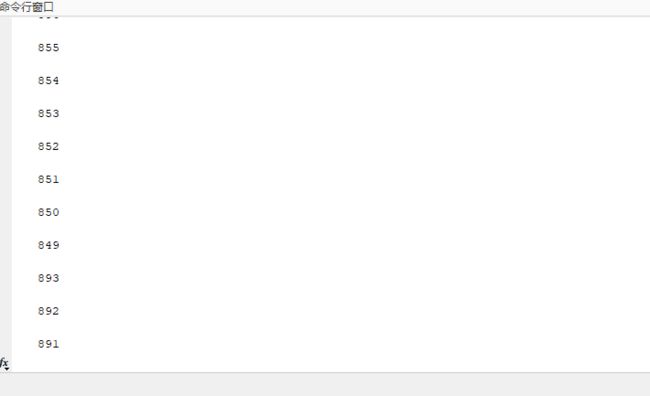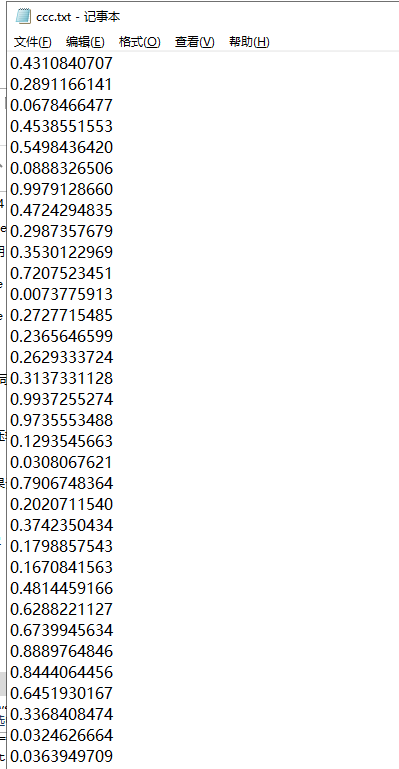matlab多线程,parfor循环进度,matlab互斥锁
一. 内容简介
matlab多线程,parfor循环进度,matlab互斥锁
二. 软件环境
2.1 matlab 2022b
2.2代码链接
https://gitee.com/JJW_1601897441/csdn
三.主要流程
3.1 matlab多线程
有好几种,最简单的,最好理解的就是parfor,就拿那个为例子了,使用情况就是每一个for循环之前不能依赖关系,每轮计算都是独立的这种,才可以用parfor,不同版本不太一样,老版限制好像更多一些
parfor i = 1:1000
disp(i);
end
3.2 parfor循环进度
用parfor并行去算一些东西的时候,有些需要循环很多次,我们是不清楚程序到底执行了多少轮,如果可以看到进度的话,时间太长了,我们或许就不会算了,
3.2.1 进度条窗口方式
会用就行,可以直接拷贝走,这个是官方文档里面找的
w = waitbar(0,'Please wait ...');
% Create DataQueue and listener
D = parallel.pool.DataQueue;
afterEach(D,@parforWaitbar);
N = 10000;
parforWaitbar(w,N)
parfor i = 1:N
% pause替换乘自己的就可以了
pause(rand)
send(D,[]);
end
delete(w);
function parforWaitbar(waitbarHandle,iterations)
persistent count h N
if nargin == 2
% Initialize
count = 0;
h = waitbarHandle;
N = iterations;
else
% Update the waitbar
% Check whether the handle is a reference to a deleted object
if isvalid(h)
count = count + 1;
waitbar(count / N,h);
end
end
end
3.2.2 底部进度条方式
会用就行,也是官方网站里面找的,这个还需要一个文件,放到同一级目录就可以了,代码我放上边链接了
% 设置循环次数
N = 10000;
% 创建一个迭代计数器对象
parfor_progress(N);
parfor i = 1:N
% pause替换乘自己的就可以了
pause(rand)
parfor_progress;
end
parfor_progress(0);
3.3 matlab互斥锁
在parfor循环中,读写数据是很麻烦的,并行计算就是要计算结果的,但是parfor中的计算结果很难接收出来,量少的时候,还可以通过数组接收(2016版不可以),量多的时候,数组接收就不太现实,每轮循环把数据写入文件中呢,parfor会报错,即使可以的话,由于matlab没有互斥锁,写文件即使可以写进去,也会是乱的,没办法用
还是那句话,会用就行,替换成自己的就可以了,注释写里面了
% 创建一个 DataQueue 对象
dq = parallel.pool.DataQueue;
file = fopen('ccc.txt','w');
% 多重匿名函数
fun_with_params = @(data) saveData(data, file);
% 在 DataQueue 上设置 afterEach 方法,
% 这个是给数据绑定一个处理方法,就是在信号发送以后,执行那个处理方法,
% 这个处理方法不是并行的,同一时刻只有一个线程在处理数据,其他的线程都要排队
% 和互斥锁的思想很像
afterEach(dq, fun_with_params);
% 在工作线程中定义处理函数并发送数据到 DataQueue
parfor i = 1:100
% 替换成自己的
a = rand();
% 在这里通过 send 函数将数据发送到 DataQueue
% 可以发送单个,也可也发送数组
send(dq, a);
end
fclose(file);
function saveData(data, file)
% 在此处编写后处理代码
fprintf(file,'%.10f ', data);
fprintf(file,'\n');
end
3.4 parfor_progress.m
function percent = parfor_progress(N)
%PARFOR_PROGRESS Progress monitor (progress bar) that works with parfor.
% PARFOR_PROGRESS works by creating a file called parfor_progress.txt in
% your working directory, and then keeping track of the parfor loop's
% progress within that file. This workaround is necessary because parfor
% workers cannot communicate with one another so there is no simple way
% to know which iterations have finished and which haven't.
%
% PARFOR_PROGRESS(N) initializes the progress monitor for a set of N
% upcoming calculations.
%
% PARFOR_PROGRESS updates the progress inside your parfor loop and
% displays an updated progress bar.
%
% PARFOR_PROGRESS(0) deletes parfor_progress.txt and finalizes progress
% bar.
%
% To suppress output from any of these functions, just ask for a return
% variable from the function calls, like PERCENT = PARFOR_PROGRESS which
% returns the percentage of completion.
%
% Example:
%
% N = 100;
% parfor_progress(N);
% parfor i=1:N
% pause(rand); % Replace with real code
% parfor_progress;
% end
% parfor_progress(0);
%
% See also PARFOR.
% By Jeremy Scheff - jdscheff@gmail.com - http://www.jeremyscheff.com/
error(nargchk(0, 1, nargin, 'struct'));
if nargin < 1
N = -1;
end
percent = 0;
w = 50; % Width of progress bar
if N > 0
f = fopen('parfor_progress.txt', 'w');
if f<0
error('Do you have write permissions for %s?', pwd);
end
fprintf(f, '%d\n', N); % Save N at the top of progress.txt
fclose(f);
if nargout == 0
disp([' 0%[>', repmat(' ', 1, w), ']']);
end
elseif N == 0
delete('parfor_progress.txt');
percent = 100;
if nargout == 0
disp([repmat(char(8), 1, (w+9)), char(10), '100%[', repmat('=', 1, w+1), ']']);
end
else
if ~exist('parfor_progress.txt', 'file')
error('parfor_progress.txt not found. Run PARFOR_PROGRESS(N) before PARFOR_PROGRESS to initialize parfor_progress.txt.');
end
f = fopen('parfor_progress.txt', 'a');
fprintf(f, '1\n');
fclose(f);
f = fopen('parfor_progress.txt', 'r');
progress = fscanf(f, '%d');
fclose(f);
percent = (length(progress)-1)/progress(1)*100;
if nargout == 0
perc = sprintf('%3.0f%%', percent); % 4 characters wide, percentage
disp([repmat(char(8), 1, (w+9)), char(10), perc, '[', repmat('=', 1, round(percent*w/100)), '>', repmat(' ', 1, w - round(percent*w/100)), ']']);
end
end



